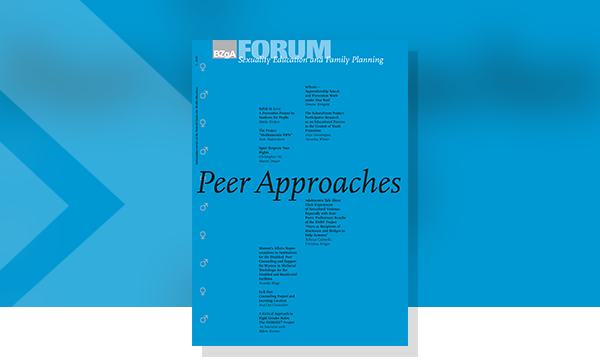In their description of a long-term peer sport project to prevent sexualized violence, Chris Ott and Marcel Drayer provide other definitions (see p. 10). In the project “Mit Sicherheit Verliebt” (Safely in Love), medical students talk with pupils about sexuality education using their own personal knowledge – the classical form of peer education. Maike Frieben reports.
It makes particular sense to work with a peer approach in cases where adolescents already possess special skills. For example, as “media scouts,” they use their existing media competence (“digital natives”) to encourage responsible, self-determined, critical use of media. The Media Scouts NRW are uniquely well situated to counsel others concerning problems and even work directly in school development. A similar project, JUUUPORT, goes even further and offers live chats (see the project sketches).
Ricarda Kluge reports on women’s affairs representatives in residential institutions and workshops for the disabled who are themselves residents or employees with disabilities and can thus well understand the needs of their colleagues.
In & Out in Berlin counsels adolescent peers concerning sexual orientation, gender identity, and coming out. The InTeam in Basel, Switzerland, trains adolescents who have yet to find a vocational training program to become peer educators for sexual health and media competence. Our interview partner, Eldem Kurnaz, introduces us to the HEROES Project, where young men with a migration background train for a year to counsel others on themes such as gender equality, the patriarchy, and family issues.
All these peer counselors have advanced enormously and profited from working on these projects. They have accumulated much knowledge, gotten to know behavioral options, and experience their own efficacy, a central component to all peer approaches.
Adolescents are now even participating in research projects and working on recommendations for youth-appropriate preventive concepts. Anja Henningsen and Veronika Winter present the project SchutzNorm. The ReWiKs Project (see the project sketches) integrates persons with disabilities in ongoing research and conception.
“Adolescents talk about their experiences of sexualized violence particularly with their peers.” The consequence of this fact and how adolescents confronted with these confessions can be better prepared to use their potential, also in terms of a possible bridge to professional assistance systems – that is the theme of the contribution by Rebecca Gulowski and Christina Krüger from the DJI.
We invite you to consider the peer approach and to allow it to inspire you in your professional work. It is worth the while!

